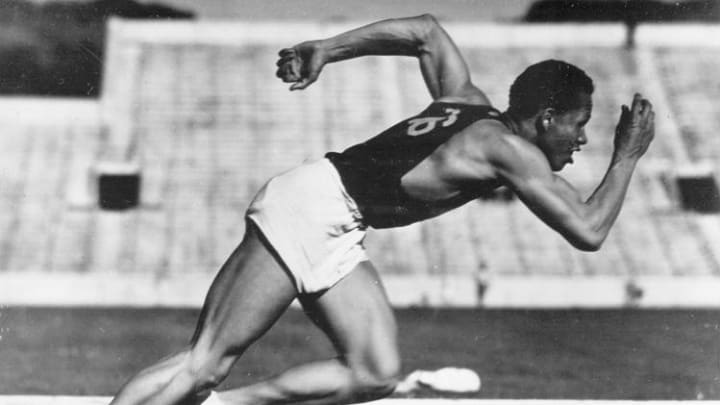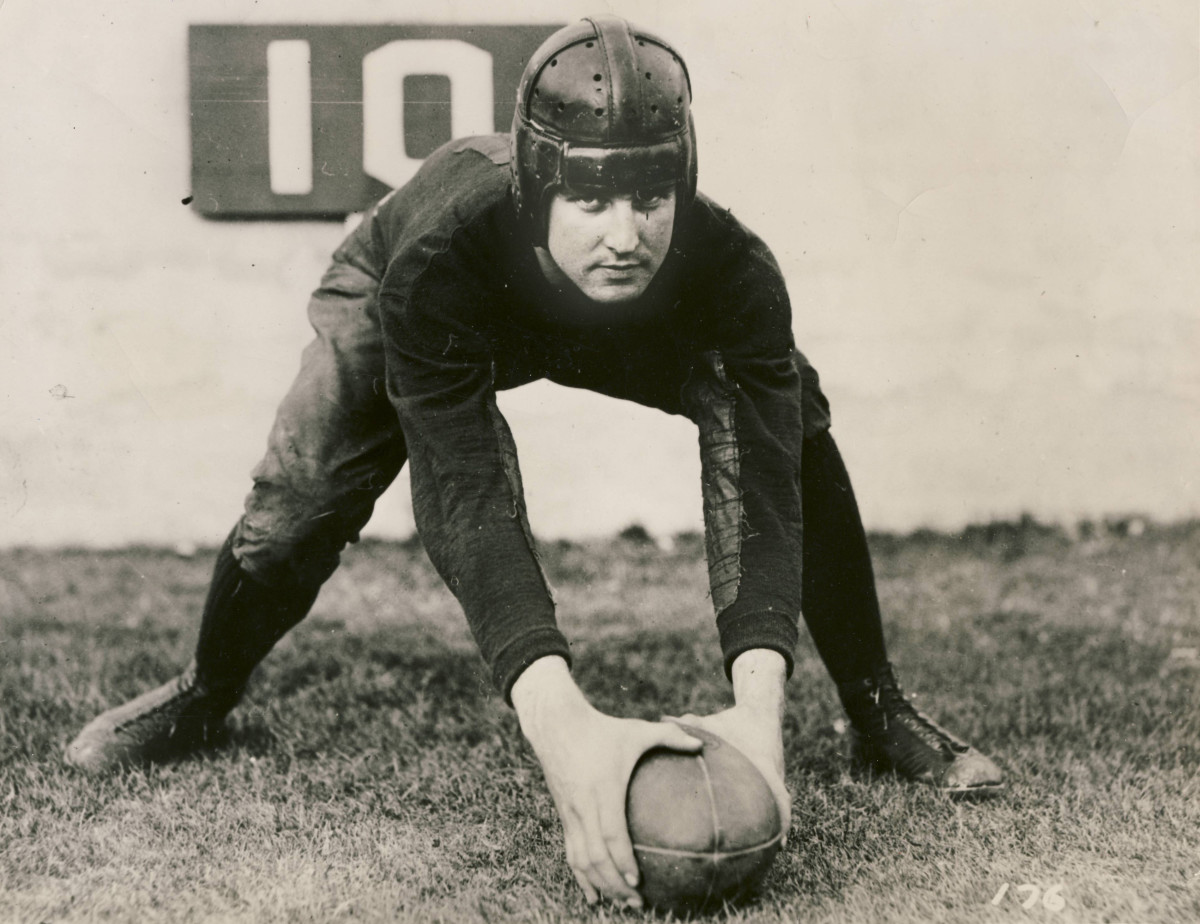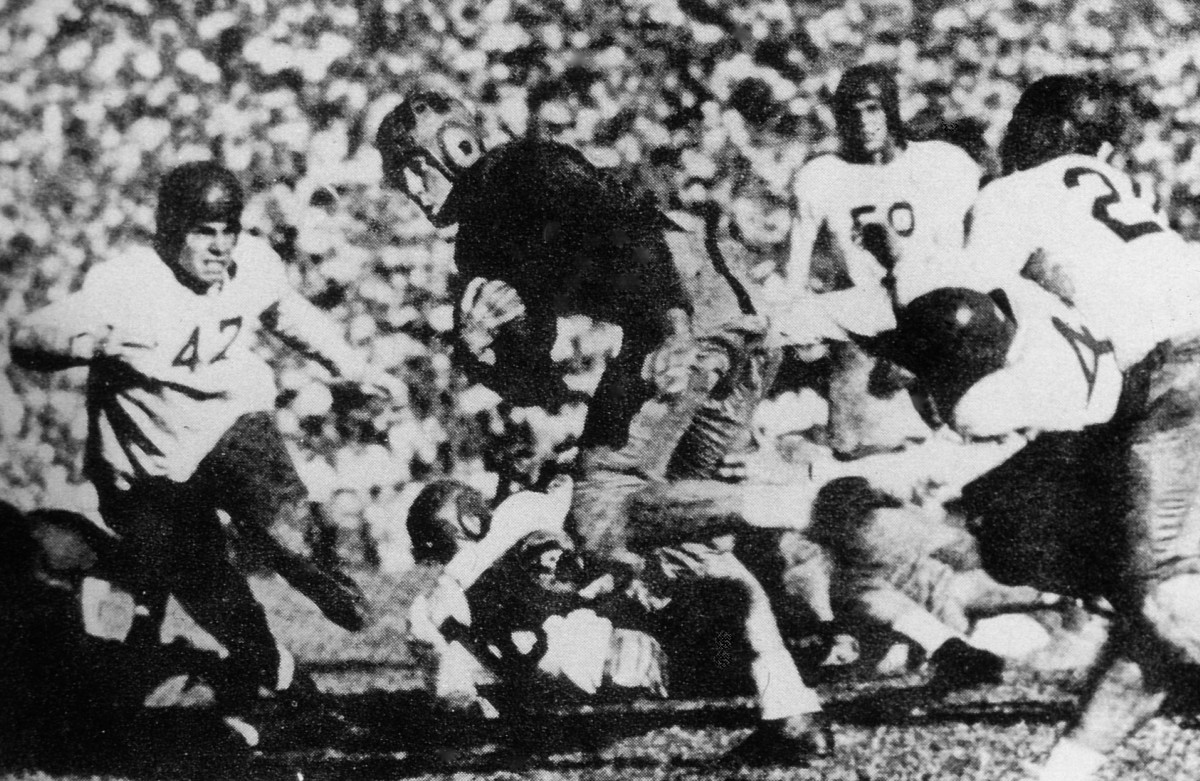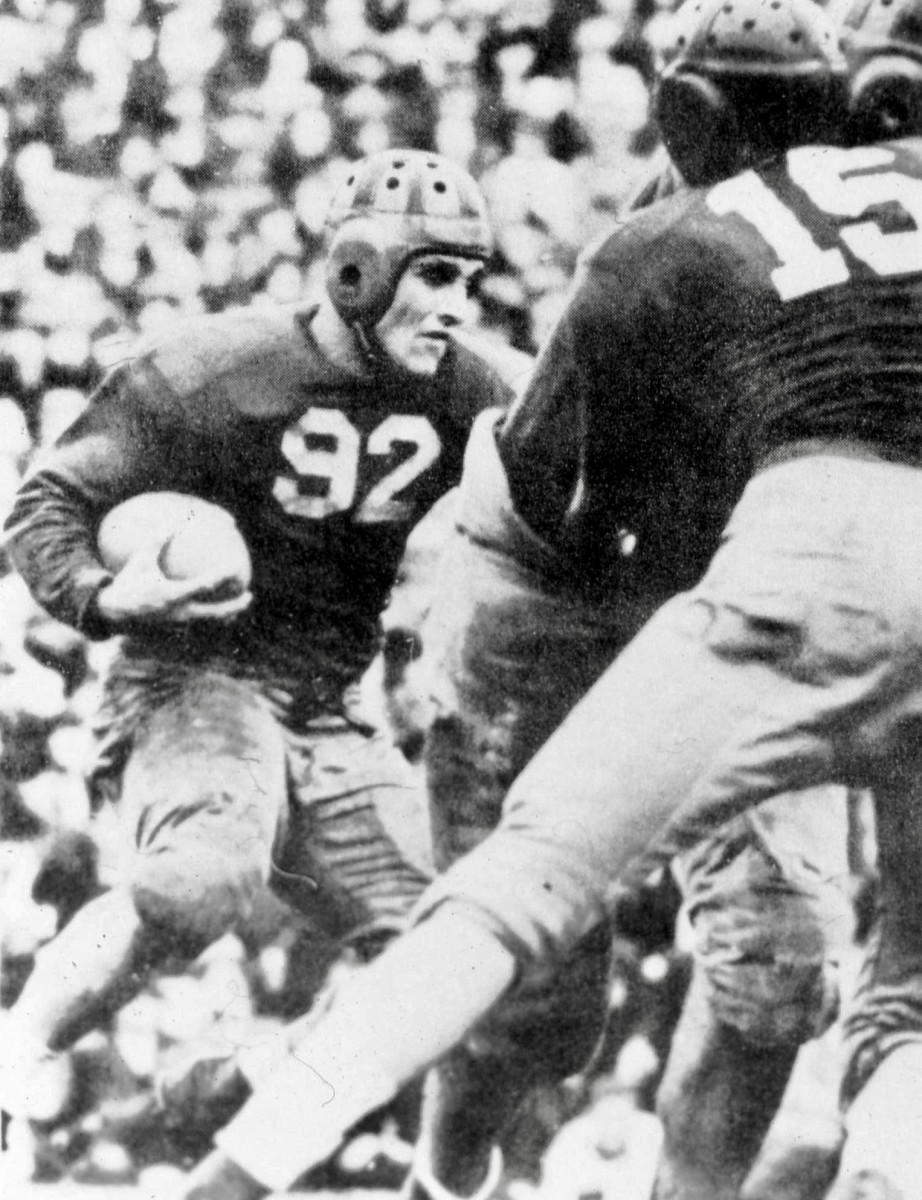The Best of the Bears, Part 3: Cal's Top Athletes of the 1930s

The 1930s was the decade of the Great Depression, but there also were significant advancements: Movies with sound and color, trans-Atlantic airmail service, frozen foods and, importantly, the creation of the chocolate chip cookie.
In the sports world, Jesse Owens, Joe Louis and Joe DiMaggio emerged as stars. Major sporting events, including boxing, Wimbledon and the Olympics, found a home on the radio, and sports developed a permanent partnership with commercialism.
At Cal, the decade began with an All-America football player making headlines with a dash in the wrong direction but also included a track man who ran his race faster than anyone before and silenced Hitler at the Berlin Olympics.
By decade’s end, Cal football had soared again, riding the legs of a pair of star halfbacks.
Here are our choices of Cal’s Athletes of the Year for the 1930s:

1929-30: ROY RIEGELS (football). He is known best in college football lore as “Wrong Way” Roy Riegels, the player who mistakenly ran 69 yards in the wrong direction after recovering a fumble against Georgia Tech in the 1929 Rose Bowl before being chased down by teammate Benny Lom. Throughout his life, Riegels was never allowed to forget his famous mistake, but he was an excellent player who earned first-team All-America honors as a center his senior season of 1929. Coach Nibs Price once called Riegels the smartest player he ever coached. Forty-two years after his blunder, Riegels was presented with membership into the Georgia Tech Lettermen's Club. "Believe me, I feel I've earned it," he quipped.
1930-31: KENNETH CHURCHILL (track & field). Churchill successfully defended his NCAA championship in the javelin in 1931, throwing 215 feet even. A year earlier, he won with a throw of 204-2, earning him All-America honors both seasons. Churchill twice set the intercollegiate record, the second time at the 1931 Big Meet with a mark of 221-7. He competed at the 1932 Olympics in Los Angeles, finishing sixth with a mark of 207-6.
1931-32: JOE KINTANA (basketball). The Bears’ leading scorer his final two seasons, Kintana averaged 7.3 points as a senior for a team that never totaled more than 41 in a game but posted a 16-8 overall record and won the Pacific Coast Conference title. He was a first-team all-conference forward that season and was named to the Helms Athletic Foundation All-America first team. Kintana was voted into Cal’s Athletic Hall of Fame in 2001.
1932-33: VARSITY 8 (rowing). Four years after a Cal team won a gold medal at the Games at Amsterdam, the Bears geared up for another run at the Olympics. Cal swept both the Pacific Coast Conference and National Intercollegiate titles and represented the U.S. at the Los Angeles Olympics. This time the race was decided by 2/10ths of a second, with the Cal squad edging Italy by one foot on its final stroke. Cal subsequently won another gold medal in rowing for the U.S. in 1948.
1933-34: HAL EIFERT (basketball). A three-year starter at forward, Eifert collected first-team All-Pacific Coast Conference honors his junior and season seasons. In his final year, he set a Cal scoring record with 252 points and was named first-team All-American. The Bears compiled a record of 53-22 during Eifert's three varsity seasons. The Stanford Daily newspaper in 1934 wrote of Eifert, "The big Golden Bear is tough and rough, with a dead eye and basketball sense."
1934-35: ARLEIGH WILLIAMS (football). The senior halfback was named to the All-Pacific Coast team and picked up first-team All-America honors by the International News Service and was a second-team pick by the Associated Press. He rushed for 1,404 yards in his Cal career, and also played baseball for the Bears. He was football team captain and president of Cal's Class of 1935. Williams later spent 20 years working at Cal, including as dean of students during the era of the Free Speech Movement. The Oakland Tribune, on the occasion of Williams' retirement, wrote, "The University of California has lost the best `point man' it ever had," adding that Williams was "one of the few to emerge from the turbulent student revolution of the 1960s having retained the trust of students and administrators alike."
1935-36: ARCHIE WILLIAMS (track & field). Williams won the NCAA title in the 440-yard dash in 47.0 seconds, setting a world record of 46.1 during the preliminary heats. The Oakland native won the 400 meters at the U.S. trials then became Cal’s first-ever individual gold medalist at the Olympics, capturing the 400 meters in 46.5 in front of Adolf Hitler at Berlin. Asked about Hitler refusing to shake the hand of U.S. star Jesse Owens, Williams said, "He wouldn't shake my hand, either." Williams went on to become a civilian flight instructor at Tuskegee and was an Air Force pilot in World War II, eventually reaching the rank of colonel.
1936-37: BOB HERWIG (football). The 1936 season was a disappointing one for the Cal football team, which recorded five shutouts but still lost five games. The Bears' best player was Herwig, a three-time All-Pacific Coast Conference center, who actually scored a touchdown against USC off a lateral the season before. In ’36, he was named to three All-America teams. Herwig was a team captain in both football and basketball his senior season. In 1964 he was named to the National Football Foundation Hall of Fame, which said of him, "College football boasted a wealth of outstanding centers in the mid-1930s, but none were more expert and diagnostic at the position than Bob Herwig." Also: Paul Newton/Richard Bennett (tennis).

1937-38: SAM CHAPMAN (football & baseball). A consensus All-America halfback, Chapman powered the Bears' "Thunder Team" to a 10-0-1 record and a national championship. Cal’s 13-0 win over Alabama is the program’s most recent triumph in the Rose Bowl. In 1984, Chapman was inducted into the National Football Foundation Hall of Fame. He batted .436 for the Cal baseball team in 1936 and, despite being selected in the third round of the 1938 NFL draft, chose to play baseball professionally. He went on to an 11-year major league career, most of it with the Philadelphia Athletics, in which he hit 180 home runs even while missing most of four seasons while serving in the Navy during World War II. At Tamalpais High, he played football under coach Roy Riegels, the former Cal All-American. Also: Johnny Meek (football), Perry Schwartz (football), Vard Stockton (football).

1938-39: VIC BOTTARI (football). Nicknamed “Vallejo Vic,” Bottari followed Chapman as a consensus All-America halfback, leading the Bears to a 10-1 record while finishing fifth in the Heisman Trophy race. A year earlier, in the Bears’ most recent Rose Bowl victory, the 5-foot-9, 180-pounder ran for 137 yards and scored both touchdowns, had an interception on defense and played all 60 minutes in a 13-0 win over Alabama. He was named MVP of the game. Bottari rushed for 1,536 yards in his Cal career, during which time he lost just one game. After college, he turned down a $4,000 offer to play with the Brooklyn Dodgers of the NFL. Bottari later was voted into both the Rose Bowl Hall of Fame and the National Football Foundation Hall of Fame.
